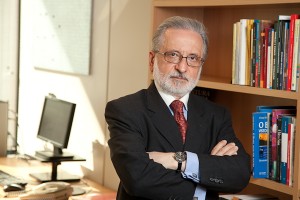Article: Simplicity and Transparency
Roberto Abdenur, Executive President of the Brazilian Institute of Ethics in Competition (ETCO)

How to do business in a country where the tax burden reaches 36% of GDP (only behind Russia, among the emerging countries); the taxes are so complex that they require specialists to deal with them; the payment of taxes requires that a company spend an average of 2.600 hours per year (ten times more than the world average); the rules change all the time (there are, on average, 40 new standards per day) and the bureaucracy to open and close companies is almost Kafkaesque? Difficult. That country is Brazil.
The 2013 Paying Taxes ranking analyzed 185 savings in three categories (rate, time to pay taxes and number of payments made) and placed Brazil in 156th place. Prepared by the PWC consultancy, in partnership with the World Bank and the International Finance Corporation (IFC), the ranking has the United Arab Emirates at the top, with an average of 12 hours per year. Argentina, ranked 149, demands 405 hours a year.
The cost of making tax payments has, of course, an impact on the amount of taxes themselves, already high. Between 1988 and 2005, the tax burden increased by almost 90% in addition to the GDP expansion. According to the Federation of Industries of the State of São Paulo (Fiesp), 64% of entrepreneurs consider that it limits investments and 59%, that it is the main obstacle to innovation, fundamental for growth.
The complexity of the tax system puts a burden on companies and individuals. Foreigners who invest in Brazil compare: while in their countries companies need a few hours to pay taxes, here they need to create departments with dozens of employees. Since the promulgation of the 1988 Constitution, more than 270 rules related to tax issues have been established. As we said, there are 40 a day.
The Brazilian Institute of Competitive Ethics - ETCO looked into the matter and, in collaboration with the São Paulo Commercial Association, Fecomércio-SP and Sescon-SP, prepared a set of proposals for the System Simplification and Rationalization Program Tax. In May, in possession of the new board of the Commercial Association, he brought suggestions for change to President Dilma Rousseff.
Based on expert studies, the suggestions are in line with the President's thinking. In her inauguration speech, Dilma stated that “the implementation of a set of measures that modernizes the tax system, guided by the principle of simplification and rationality, is urgent.
Aiming to avoid an environment of legal uncertainty, simplifying processes, changing provisions of the National Tax Code and adapting the legislation to the current demands of Brazil, the suggestions delivered to the President include a proposal for a constitutional amendment (PEC), a draft complementary law (PLC) and a draft of ordinary law (PL).
Among other measures, they prohibit the publication of a provisional measure on tax matters; prohibit the collection of taxes before 180 days have elapsed from the date on which the law is published; limit the amount of tax fines and force the Treasury to disclose criteria for the income statement by December 31 of the previous year.
From the micro-entrepreneur to the public agent, everyone benefits from simplification. The debate requires that the ICMS remodeling be discussed as well. The simplification of this tax is essential for the end of the fiscal war.
The overhauls will help formalize small businesses. A recent survey by SPC Brasil and the National Confederation of Shopkeepers showed that almost half (49%) of these entrepreneurs do not know what to do to regularize their business. Among those who want to expand it, the majority do not intend to formalize it because they fear bureaucracy, falling income and new costs.
The establishment of the MEI (Individual Microentrepreneur) in 2008 was a major step towards formalization. The maximum annual income limit of R $ 60 thousand, however, ends up reducing the number of individual micro-companies. There is an urgent need to review this limit.
These measures can help to reduce tax evasion, which reaches 30%. The system's complexity has been used by tax evaders as a justification for not paying taxes. It thus benefits transgressors, deteriorates the business environment, removes investments and reduces the country's growth potential.
It is true that, in recent years, Brazil has become much more efficient in tax management. Several initiatives specifically supported by ETCO have produced important results. One of them is the Electronic Invoice (NFe), implemented in 2008, which reduces the bureaucracy in commercial transactions.
In its most recent study on Latin America and the Caribbean, the Inter-American Development Bank (IDB) says that the key to any good tax is to be simple. The study, entitled “It is not enough to collect: taxation as a development tool”, says that the region needs a new generation of tax and tax reforms to reduce income inequality, contain evasion, stimulate productivity, strengthen local governments and preserve natural resources.
The modernization of the tax system is fundamental to stimulate the economy. But more transparency on the part of public authorities about how they manage this range of products, which are taxes, is also essential. Simplicity and transparency are essential for taxation in Brazil to become less unfair to the population and less costly and counterproductive to the economy.



